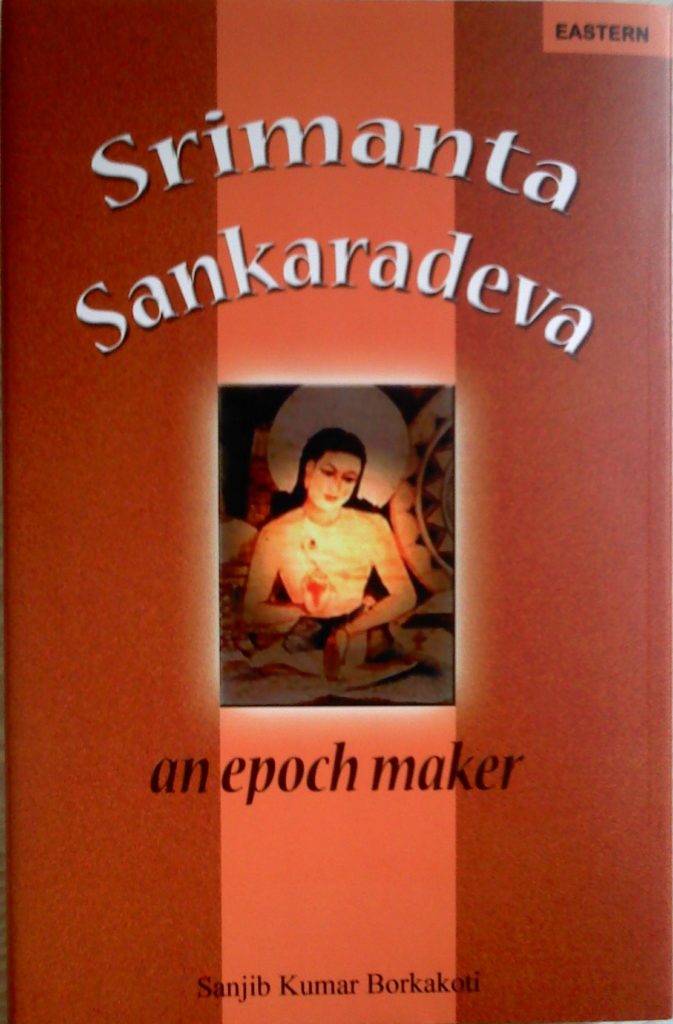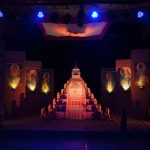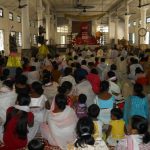I have always considered Srimanta Sankaradeva as my role model. His multi-faceted contributions fascinate me. Our socio-cuItural lives are permeated by his influence even now. I feel proud that he was born in Assam. But very little was known about him outside Assam till some time ago. It has therefore been my endeavour to let people know about him and his unparalleled works. I have written what I have learnt about his life, works and philosophy. Till date 26 books about the saint have been published from my pen in both English and Assamese. I have written in Times of India, Prabuddha Bharata, Bhavan’s Journal etc about the saint. My personal blog www.borkakoti.blogspot.in has details of these works. But sometimes I feel that all these are not sufficient as people are gradually giving up reading books or journals, because of either change in taste or professional compulsions. A different medium is necessary to spread the message of the saint.
However at the same time I was impressed by the way my book ‘Mahapurusha Srimanta Sankaradeva’ (Bani Mandir, Guwahati, 2005) was accepted globally. The publishers gave this book as gift to many persons. This book was displayed in the Frankfurt Book Fair in 2006. After that it was procured by several libraries across the world. About 30 international level libraries have procured this book by now. Library of Congress listed it. They had earlier listed my book ‘Sri Sri Sankardeva’ also. Universities like Chicago, Heidelberg, Boston, Michigan, Toronto, Yale etc collected the book ‘Mahapurusha Srimanta Sankaradeva’ of their own accord and I came to know about it only through internet. Michigan University even digitized the book. These development gave me confidence. Back home, there was almost no discussion on my books, because of which I was a bit uncomfortable. But I knew that it would take many more years to have evaluation of my works as I had started analyzing the saint’s works from completely new perspectives. Even now there is very little discussion on my books; rather there have been a lot of plagiarism by many a ‘researcher’. The acceptance abroad was therefore a boost for me. When Department of Vaishnavism in University of Madras incorporated Srimanta Sankaradeva in their curriculum, they too relied on this book, Professor Narasimhachary of that Department told me.
In the mean time I observed that the young generations were taking the internet as the sole source of knowledge. It was this observation that made me explore new ways, new medium to spread the life, works and philosophy of Srimanta Sankaradeva. I chose the popular social networking site Facebook for that purpose since the largest section of the internet users maintain accounts in Facebook. On February 23, 2011, I created the group ‘Followers of Srimanta Sankaradeva’ (FSS) in Facebook. I designed it in such a way that it soon became an international group of people dedicated to spreading the message of Srimanta Sankaradeva globally. The multi-faceted works of the saint in diverse fields like religion, literature, music, dance, drama, architecture, social reconstruction etc are highlighted in numerous articles preserved as document files in this group. There is no barrier of caste, creed, sex or religion in this group. People from all religions and all countries are added here as members with equal status and without any fee.
FSS has succeeded in uniting different factions among the traditional followers of Srimanta Sankaradeva. Upholding the Sankari principles is a priority of the group. Many precious photographs of Thans and Sattras and their cultural resources have been posted in the wall of the group with detail information about each item. One can get a comprehensive picture of the Srimanta Sankaradeva legacy in this group. There are about 22,000 members in FSS now. There are more than 2000 valuable photos and videos, some exclusive photo albums and about 90 documents of articles in this group. Most of the articles are research-based. Many of my own articles on life, works and philosophy of Srimanta Sankaradeva are uploaded in this group. The FSS members have to abide by a set of principles regarding posts, uploads, comments etc. Commercial activities are strictly prohibited in the group. Thus it is a disciplined group.
A few members of ‘Followers of Srimanta Sankaradeva’ founded a real body to promote the goal of this group as well as to supplement its effort. This real body is ‘Society for Srimanta Sankaradeva’. The members of ‘Followers of Srimanta Sankaradeva’ extend all possible helps to ‘Society for Srimanta Sankaradeva’ in its real activities. ‘Society for Srimanta Sankaradeva’ is a society formed under the S R Act, 1860 of India in May 2011. It has organized events, conferences and published books, brochures etc. It published ‘Great Songs’, which is translation of Srimanta Sankaradeva’s unique lyric composition, Bargît. The Society also brought out English translation of Srimanta Sankaradeva’s holy book ‘Gunamala’. Both the translations were done by me. Of late the book ‘Great Songs’ has been made available globally as an ebook. The ebook edition can be procured at http://www.amazon.com/Great-Songs-Rendering-Sankardevas-ebook/dp/B00BYANA3O/ref=sr_1_1?ie=UTF8&qid=1363904270&sr=8-1&keywords=sanjib+kumar+borkakoti.
The official website of ‘Society for Srimanta Sankaradeva’ is www.sankaradeva.com. It was launched on January 1, 2012. It is dedicated to spreading the message of Srimanta Sankaradeva globally. There are many research-based articles in this website, apart from video of Bargeet, Naam-Kirtan, Sattriya Nritya etc. It is also a social networking site, where any one can register as member. About 500 persons have registered in our website. They can upload matters in the website themselves. We screen these posts daily so that nothing irrelevant gets posted. Srimanta Sankaradeva Sangha also asked us to design their website www.srimantasankaradevasangha.org, which we did.
Society for Srimanta Sankaradeva has kept Majuli in its objective since this island is nerve-centre of Sankari culture. We have assisted the preparation of dossier for UNESCO to apply for WHS status for Majuli. We held an International conference on Majuli on July 8, 2012. It was organized in collaboration with several international bodies – Core Professional Group-Brahmaputra, Friends of Assam and Seven Sisters (FASS) International (USA), Assam Society of America Foundation (USA), and Majuli Cultural Landscape Management Authority (MCLMA). I was made a nominee of the Government of Assam in the Heritage Sub-Committee on Majuli of Archeological Survey of India in 2011. I attended several meetings and workshops of Archeological Survey of India. In all these I suggested several corrections in the dossier to be submitted to UNESCO; I emphasized on highlighting the contribution of Srimanta Sankaradeva in making Majuli unique. I also suggested the name of Batadrava Than for world heritage status.
The Society has done some other innovatinve works. It held a workshop in Dibrugarh University at Centre for Management Studies (CMS) on September 24, 2011 on the topic ‘Relevance of Sankaradeva Legacy in Management’, in association with the Centre for Management Studies. This workshop threw light on a new dimension of Sankaradeva study. Our Society also took up with NCERT the matter of incorporating life and works of Srimanta Sankaradeva in curriculum in all levels; they responded positively and we are hopeful of more inclusion about the saint in text-books. An international level petition campaign was also carried out through www.change.org. Many people from USA, UK, Netherland, South Africa etc signed this petition, which we submitted to NCERT.
Apart from works through the Society for Srimanta Sankaradeva, I have published several English titles on Srimanta Sankaradeva, which have helped people outside Assam and India learn about Srimanta Sankaradeva. Some of these are Sarvagunakara Srimanta Sankaradeva (2000), Saint Srimanta Sankaradeva (2008), Place of Srimanta Sankaradeva in all India perspective (2007), Unique contributions of Srimanta Sankaradeva in religion and culture (2006), Namghosha : an oriental gem (2006). The book ‘Namghosha : an oriental gem’ is English rendering of Madhavadeva’s Namghosha. I sent the book Sarvagunakara Srimanta Sankaradeva to several scholars abroad as gift. Needless to say, none of them had even the courtesy to acknowledge it.
Then came my book ’Srimanta Sankaradeva : an epoch-maker’ in late 2011. It discusses the multi-faceted contributions of Srimanta Sankaradeva, which enriched the social, cultural and spiritual lives of Indian people, especially the people of Assam. This book has brought out the pioneering role played by the saint in the socio-cultural arena. The all-round impact of Srimanta Sankaradeva on the Assamese society, culture and literature is the central theme of this book. As a whole, I tried to bring out the unique characters of Srimanta Sankaradeva’s contributions in diverse disciplines. One can contact the publisher EBH Publishers (India) at easternbookhouse@gmail.com or info@easternbookhouse.in for collecting the book. They have branch in New Delhi too. There were exposure to some of my books on Srimanta Sankaradeva in Beijing Book Fair in 2009 and Seoul Book Fair in 2013 too. My publishers Bani Mandir took the books to these book fairs.
Interestingly, I have never had any problem in all my activities with any non-Assamese people. Each and every non-Assamese person has been overawed by the great contributions of the saint and expressed his/her gratitude for letting know about the genius who had pioneered feminism in the world, who was the pioneer of drama movement in India. I have faced whatever problem I had from my fellow Assamese people only. A section of our own people questioned me and my group at every step. The venture of taking the saint to global fora through internet was questioned in some quarters. We were maligned in both print and electronic media by even educated people. Our photos were flashed on TV channel as frauds in prime time news telecast. Society for Srimanta Sankaradeva was accused falsely of collecting money from Facebook group members. Clippings of the news telecast were uploaded in youtube. These are still there. But nothing stopped us because we knew what we were doing. Our admirers told us “Even Srimanta Sankaradeva suffered at the hands of detractors in his times.” So we tolerated all false propaganda and today we are now accepted as global carriers of the saint’s message.
Acknowledgement :
This article was earlier published in the website www.sankaradeva.com




